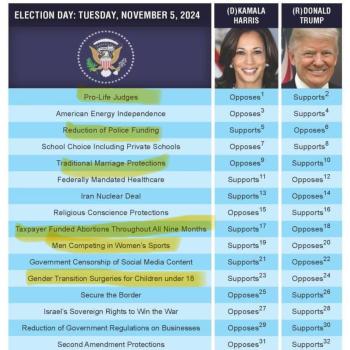In light of this week’s events, I offer an essay adapted from an old homily, instead of my weekly podcast. Countless Christians have prayerfully tuned in to watch the direction that the Methodists have taken. Traditionalists may have won a victory yesterday, although I did not see anyone taking a proverbial victory lap. The reality that many people woke up with this morning is that there is an entire denomination to save, which may be fracturing over these issues. Whole people groups are hanging in the balance. Is the fellowship breaking?
All the nations will be gathered before Him, and He will separate them one from another, as a shepherd divides his sheep from the goats. And He will set the sheep on His right hand, but the goats on the left. Matthew 25.32-33, NKJV
i. We think primarily of the individual
We think of individuals facing judgment. Western society trains us to think in terms of individuality. We think of individual responsibility. However, I think it is curious that Jesus begins this Last Days judgment scene with the word “nations.” In the Greek, this is the word ethnos.
Nations does not mean countries of land. We typically think of nations as America, Canada, Mexico, etc. Yet in the Bible, and in those days, nations are entire people groups. This is easy to remember, because our words ethnic and ethnicity are from the word nations, ethnos.
It is interesting that Christ calls forth the nations.
ii. Entire people groups are going to answer to God
Let’s make this practical. This was a popular phrase in the ’80’s, “Oh c’mon! Everybody’s doing it!” I don’t know how that became such a popular phrase. That may be true to a degree, but according to Scripture, if entire groups of people are doing it out of line, they’re going to answer as a people. So everyone that’s doing it is going to pay for it.
We are not just talking about cultural distinctions. This parable is talking about behavioral distinctions as well.
Jesus speaks of this judgment of nations in other Texts. He pronounces judgment on people groups in Matthew 11 and Luke 10.
iii. Jesus preaches a sermon of “Woes” to entire cities
Then He began to rebuke the cities in which most of His mighty works had been done, because they did not repent: “Woe to you, Chorazin! Woe to you, Bethsaida! For if the mighty works which were done in you had been done in Tyre and Sidon, they would have repented long ago in sackcloth and ashes. But I say to you, it will be more tolerable for Tyre and Sidon in the day of judgment than for you. And you, Capernaum, who are exalted to heaven, will be brought down to Hades; for if the mighty works which were done in you had been done in Sodom, it would have remained until this day. But I say to you that it shall be more tolerable for the land of Sodom in the day of judgment than for you.” Matthew 11.20-24, NKJV
Jesus is calling them out, saying they will face judgment as a city. He runs with the idea that You had a choice as a region and as a city. So you could have repented, but you didn’t. On the other hand, Jesus plants the seeds for the Gospel truth that whole cities can repent.

iv. Jesus compares impenitent cities to Old Testament cities
Christ keeps the truth in front of us that we have a responsibility to reach entire cities with the love of God. He says to Chorazin and Bethsaida that He has shown up and shown them miracles, but they did not repent. He says that if the same miracles were performed in the Old Testament region of Tyre and Sidon, which is compared to the throne of Satan (Ezekiel 28), Tyre would have repented. Jesus says that if the miracles that He did in Capernaum would have been done in Sodom, they would have repented (Genesis 19).
As one who has spent much of his life in the Bay Area of California, I have heard all the doomsday prophets speak of judgment. I have even heard people predict that acts of God will destroy certain regions in the West. I’ve replied many times that Jesus says that if Tyre, Sidon, and Sodom would have seen the miracles of Christ, they would have repented.
v. Without excuse
So on judgment day when some cities stand before God, guess who will have no excuse? The Church, because we didn’t reach the city with the miraculous power of God.
There is no sin that God cannot forgive and change. It just takes the love of God in action and the signs of the Almighty. Whole people groups are looking for a supernatural experience.
I consider it to be hypocritical if Christians condemn certain lifestyles, and then allow others to remain in the church who are engaging in illicit sex. We don’t seem to have a problem helping people overcome certain forms of sexual sin, but we cast nothing but judgment on other forms of perversion. As Christians, we are without excuse if we do not share the transformative Gospel with all. God only blesses sex in a marital union between one man and one woman. I’m thankful to be part of a fellowship that recognizes this Biblical truth in our governing documents.
If we share the Gospel from a visible community of faith, it is very attractive. Whole people groups are looking for a vibrant, loving, transformative community. The book of Acts bears this out as thousands come to the Lord in a moment. Whole households make decisions. Everyone on the island of Malta joins the Body of Christ.
vi. People groups approach the throne
In the Parable of the Sheep and the Goats, whole people groups approach the throne. They give some sort of account collectively. Then the peoples who have lived together in communities, tribes, and even congregations are separated as sheep and goats.
They may answer as a people . . . but then they will be separated like sheep and goats.
I remember an elementary school field trip to a goat farm. As soon as the class entered the big holding pen for the goats, I was pretty excited. I can’t remember seeing goats up close before. Then it felt like someone hauled off and kicked me from behind. I stumbled forward and tried to hold back the tears. I turned around and no one was there, but a goat. I was hurt . . . literally . . . and emotionally. I’ve always loved nature and God’s creatures. I really wondered why that goat would do that? What had I ever done to it?
I don’t know how many times in the Church, I’ve got blindsided over the years. Why would Christians do that? What have I ever done to them?
vii. The sheep and the goats
With this theme that we are chasing in this essay, my experience leads me to believe that Christians who are judgmental over one issue, are judgmental over other issues. However, Christians who are driven by the Spirit to seek lost souls always lead people to the Cross first, before explaining the Great White Throne Judgment. Sin is sin. There is no doubt, but we all start by laying our sins down at the Cross.
Are we meek and lowly sheep like the Good Shepherd (Matthew 11.28-30)? Or are we ramming each other and locking horns all the time like goats? Apparently, there are goats who mingle with the true flock of sheep, otherwise Jesus won’t have to separate them in the Last Day.
Only the Shepherd knows the difference and He will make the final call! Our Lord Jesus Christ, the Son of God, will separate the sheep and the goats.












